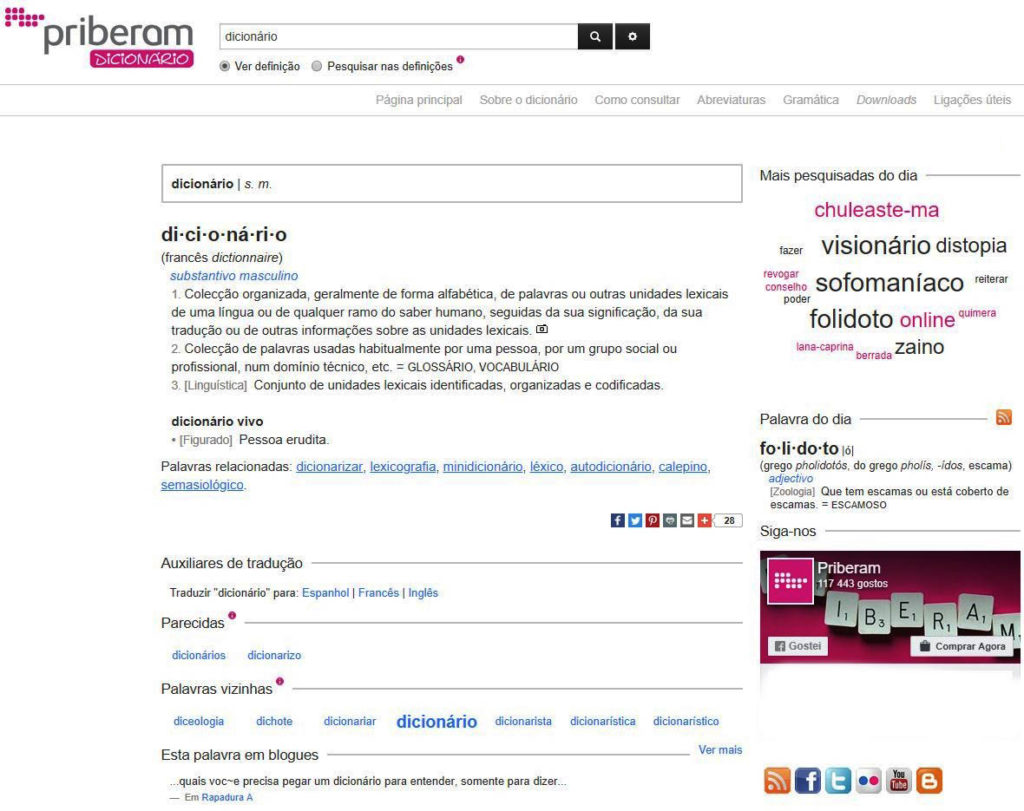April 1, 2019 marks the tenth anniversary of the Priberam Dictionary of the Portuguese Language, which, over a decade, has established itself as a synonym for Portuguese-speaking dictionary worldwide.
Today, “Priberam”, as it is often called, is no longer just a dictionary, but a true lexicographic platform: from https://dicionario.priberam.org it is possible to access morphological information, definitions, synonyms, antonyms, examples, syllabic division for translineation, conjugation, related words, similar words, neighboring words, translation aids, observations, occurrences of real use (blogs, Twitter) and word cloud most searched of the day.
The advantages of the digital dictionary over its paper counterparts are also evident through the “Search in definitions” functionality, which allows you to find a word through one or more terms that are part of its definition.
Between 2009 and 2019, Priberam Dictionary has not stopped growing, either in the number of entries, or in the number of users and accesses – from Portugal, but also from all over the world. The complete list of accesses includes 228 countries or territories and this was one of the reasons why the Priberam Dictionary moved from the .pt domain to the .org domain.
Thus, the number of entries increased by 37% (from 97.513 in 2009 to 133.459 in 2019), while there was an explosive growth in online queries: 132 million queries in 2018, made by 37 million people – an increase of 120% compared to the year of its launch.
The dictionary has also been improved with new features. The word cloud shows which terms are most searched daily and, since 2010, the entries can also include images (today there are more than 3000 definitions that include a photograph to better illustrate a certain meaning).
Practically from the beginning, the “Word of the Day” initiative was created – an unusual, curious or relevant word for today, which is published daily either on the dictionary page itself or on social networks (Facebook, Instagram and Twitter).
Outside its website, Priberam Dictionary has been, since 2011, integrated as a reading aid in Kindle and Kobo e-book readers. Furthermore, it has also been integrated into the FLiP spell checker for Windows and for Mac OS X.
As for mobile platforms, the website https://dicionario.priberam.org it can be used on all devices that support a browser as it is responsive and as such usable with any screen size.
The continuous improvement of the dictionary, accompanied by its constant increase in users, has placed “Priberam” in a prominent position in popular culture.
Nowadays, the dictionary is mentioned in court decisions (to clarify the meaning of words that may have an injurious character, for example), used in marketing campaigns (on April 1, 2017, the entry “KitKat” was temporarily created; in 2018 the Word Woman campaign, with the Fox Life channel, was considered one of the 10 best of the year) and is even a work of art (project “History of Crime” for João Louro's exhibition at MAAT).
There will hardly be more complete proof of the impact of Priberam Dictionary on popular culture than its use in the rhymes of a rap (“Solero” by Benji Price) or when you name it (“Knights of Priberam”) to a parody on Rádio Comercial.
O Year in Words is another initiative that flows naturally from Priberam Dictionary and which, in December, reviews the most important moments of the year, not with votes, but through the words effectively most searched by dictionary users.
The first “Year in Words” started in 2016; in 2017 and 2018, Agência Lusa joined the initiative.
Carlos Amaral, CEO of Priberam, said by the way: “Ten years ago, it was hard to imagine the importance that our dictionary would have a decade later. Today, the relevance of the Priberam Dictionary is undeniable and confirms the bet we made early on in digital platforms.”
“Furthermore”, concludes Carlos Amaral, “the dictionary also ends up playing a role that is transversal to the work we do today in advanced areas that are not always visible to the common user, such as semantic analysis or artificial intelligence applied to the language, whether in Portuguese or in other languages."



















Comments